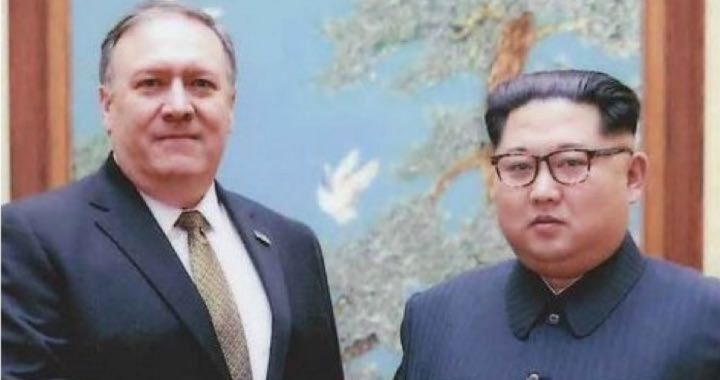
As the world waits to see how the meeting between President Trump and North Korea’s Kim Jong-un (shown on right) on June 12 plays out, the message sent by the Trump administration through Secretary of State Mike Pompeo (shown on left) has been conciliatory compared to the strong rhetoric that passed between Kim and Trump last year.
Only last August, Trump warned the Pyongyang regime: “North Korea best not make any more threats to the United States. They will be met with fire and fury like the world has never seen.” Following Trump’s statement, a spokesman for the Korean People’s Army threatened to fire a long-range missile against the U.S. base in Guam if it felt provoked by the Americans.
The change in the nature of exchanges between Pyongyang and Washington has become more pronounced since the summit between Kim and South Korean President Moon Jae-in in late April, during which Kim told Moon that he would abandon his nuclear weapons program if the United States agrees to formally end the Korean War and promises not to invade his country. A few weeks prior to that, around April 1, then-CIA Director Pompeo made a top-secret visit to North Korea as an envoy for Trump to meet with Kim.
On April 18, Trump spoke optimistically about that meeting and tweeted: “Mike Pompeo met with Kim Jong Un in North Korea last week. Meeting went very smoothly and a good relationship was formed. Details of Summit are being worked out now. Denuclearization will be a great thing for World, but also for North Korea!”
Speaking on Face the Nation with Margaret Brennan on May 13, Pompeo said the United States would not be willing to invest taxpayer dollars to help the communist state, but was willing to “lift sanctions” as a prelude for private American investment in North Korea’s energy, agriculture, and infrastructure sectors.
Pompeo told Brennan: “What Chairman Kim will get from America is our finest, our entrepreneurs, our risk takers, our capital providers, not [aid from] our taxpayers.”
Brennan then asked, “That sounds like sanctions relief to make it possible for a company to invest directly in North Korea. When would you do that?”
Pompeo replied: “Ma’am, if we get denuclearization, of course there will be sanctions relief, certainly. There will be more than that.”
The success of the Trump-Kim meeting may well depend on whether Kim now regards economic prosperity as more important than adhering to steadfast communist philosophy.
Photo of Mike Pompeo and Kim Jong-un: White House
Related articles:
Trump to Meet North Korea’s Kim on June 12 — but Will the Two Agree to Anything of Significance?
Will Kim and Trump Finally End the Korean War?
North Korea Not Interested in Diplomacy Until It Has ICBM Capable of Reaching U.S. East Coast
Trump Imposes More Sanctions on North Korea, Calls Kim “Madman”



